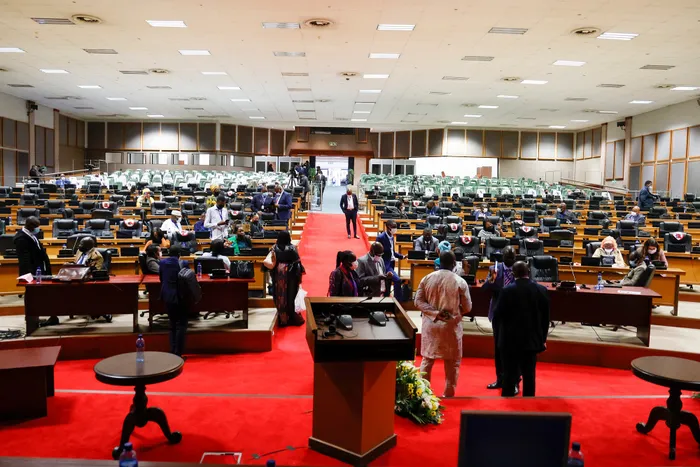The Pan African Parliament has a new leader, now it needs to get its house in order

By Chad Williams
On Tuesday proceedings at the continental legislative body, the Pan African Parliament (PAP), kicked off to a heated start in South Africa.
275 African parliamentarians came together at the PAP to elect new leaders and map out the way forward for a continent battling rampant unemployment, rising food and petrol prices, as well as a chronic electricity shortage.
While the PAP voted for its leadership on Wednesday, electing Zimbabwean Member of Parliament (MP) Fortune Charumbira as the new president, it has its work cut out going forward.
This ordinary session of the fifth Parliament of the PAP was officially opened by African Union Commission (AUC) chairperson Dr Moussa Faki Mahamat standing in for African Union (AU) chairperson and Senegalese President Macky Sall.
In his opening address, Faki Mahamat called for “unity and to put Africans first” at the opening ceremony of the PAP Session.
During the proceedings on Tuesday, Zimbabwean legislator, Tatenda Mavetera, was sworn in as a member to replace Barbara Rwodzi, who was appointed Deputy Minister for Environment, Climate, Tourism and Hospitality Industry by Zimbabwean President Emmerson Mnangagwa.
At the time Malawian parliamentarian and presidential candidate at the PAP, Yeremia Chihana, lambasted South Africa for “endorsing” Charumbira.
Seemingly, the focus has been on the operations of the house.
It has been noted that the chief executive officer and legal representative of the Union will also chair the plenary session dedicated to the election of the president of the PAP.
According to PAP, the exceptional measure is due to the absence of the Bureau of the PAP and is guided by Article 14 (1) of the PAP Protocol, which stipulates that the plenary session of the Parliament shall be presided by the chairperson of the Union until the election of the president of the Parliament who shall thereafter preside.
As part of the delegated authority by the chairperson of the AU, Mahamat will also oversee the swearing-in of new members of the PAP.
The electoral process will also be conducted and managed by the Office of the Legal Counsel of the AU.
A group of southern African states is advising and actively supporting Charumbira's, candidacy for the top seat were adamant that he is the right man for the job.
Meanwhile, Southern Africa insists it is its turn for the presidency of the PAP because other regions in Africa have held the top post before and the rotation principle has been endorsed by the AU.
I think it is safe to say that the PAP needs a reminder as to what its mandate is.
The objectives and functions of the Parliament are set out in the Protocol to the Abuja Treaty on the PAP and in its rules of procedure that include but are not restricted to:
- Facilitating and overseeing the implementation of AU policies, objectives and programmes
- Promoting human rights and consolidating democratic institutions and culture, good governance transparency and the rule of law by all AU organs, regional economic communities (RECs) and member states
- Participating in creating awareness among the peoples of Africa on the: AU’s objectives, policy aims and programmes; strengthening continental solidarity, co-operation and development; promotion of peace, security and stability; and pursuit of a common economic recovery strategy
- Contributing to the harmonisation and co-ordination of member states’ legislation
- Promoting the coordination of the RECs’ policies, measures, programmes and activities
- Preparing and adopting its budget and rules of procedure
- Electing its Bureau members
- Making recommendations on the AU budget.
South Africa’s EFF leader Julius Malema is very adamant that PAP must now begin to legislate in Africa to further encourage democracy on the continent. He has been sworn in as a member of PAP.
His sentiments are hot on the heals of the portfolio committee on International Relations and Co-operation approving two important international agreements for ratification.
The protocol to the Constitutive Act of the AU relating to the PAP provides that it shall be the legislative organ of the AU, which may propose draft model laws.
The establishment of the PAP aims to ensure full participation of the African people in the development and economic integration of the African continent.
The 2014 protocol provides that at least two of the five elected members by each member state shall be women, as against the current arrangement that provides that at least one shall be a woman. Furthermore, a delegation that does not satisfy this requirement shall not have the right of accreditation for representation in the PAP.
It has been noted that the protocol provides that the seat of the PAP shall be located in the Republic of South Africa, but also that the PAP may convene in the territory of any member state at the invitation of that member state.
Importantly, the bureau of the PAP shall be elected on a rotational basis among all the five regions of the AU.
The chairperson of the committee, Mr Supra Mahumapelo believes that the issue of one region being on the bureau for a long time will not arise again as it will be addressed through rotation.
This means that going forward PAP must truly get its house in order if it so wishes to be taken seriously rather than turning into yet another circus.
Williams is a reporter for the African News Agency and focuses on current affairs in Africa
This article is published by The African. To republish, see terms and conditions
Related Topics: